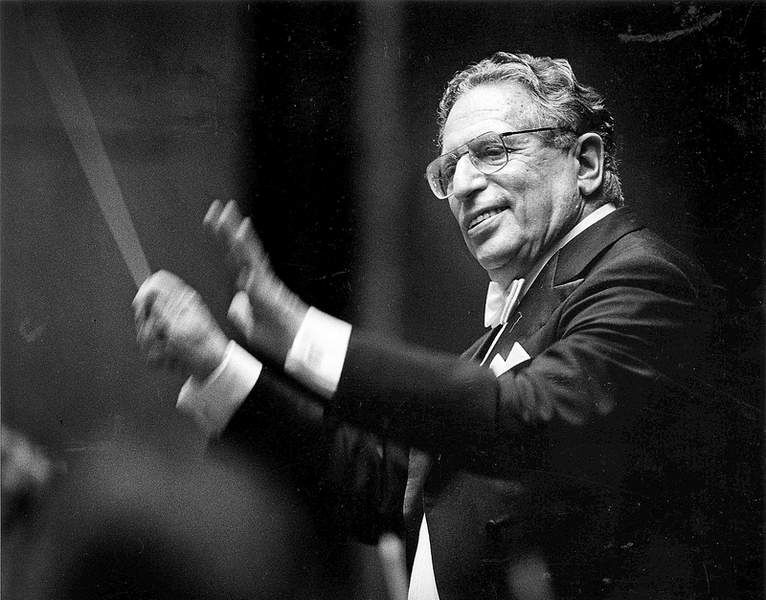Kurt Sanderling, 98, led music under Soviet rule
Published 5:00 am Friday, September 23, 2011

- Conductor Kurt Sanderling, seen here with the L.A. Philharmonic in 1989, led orchestras under Soviet rule and won admirers later in his career as a guest conductor abroad. Sanderling died Saturday at 98.
Kurt Sanderling, who led the Leningrad Philharmonic and the East Berlin Symphony Orchestra under Soviet rule and won admirers in the West later in his career as a guest conductor for orchestras in London, Los Angeles and elsewhere, has died.
Sanderling, who would have turned 99 Monday, died Saturday in Berlin of causes related to old age, said his son, Stefan.
Sanderling won critical respect for his intellectual grasp of music and his skill at conveying emotion, particularly as a conductor of the Romantic composers Johannes Brahms, Ludwig von Beethoven and Robert Schumann.
He was a sensitive interpreter of the symphonies of Dmitri Shostakovich, a friend whose music echoed life in the Soviet Union under Josef Stalin.
“Mr. Sanderling was hyper-intelligent but at the same time he brought the most humane quality to his conducting,” pianist Mitsuko Uchida said in a 2005 interview with the Los Angeles Times. “With his strength of character and his great humanity, he contributed what players would not otherwise know.”
A large, somber man with wavy hair who bore a strong resemblance to former U.S. Secretary of State Henry Kissinger, Sanderling might have had a very different kind of career had it not unfolded primarily behind the Iron Curtain.
“Kurt Sanderling was a great conductor but too few people knew that because he spent so much time in East Germany and Russia,” Ernest Fleischmann, chief executive of the Los Angeles Philharmonic when Sanderling first performed with the orchestra in 1984, once observed.
“He played all the basic repertoire … as though it had been composed yesterday,” Fleischmann, who died last year, told the St. Petersburg Times in a 2003 interview. “Very few conductors are able to do that.”
Sanderling was born in Arys, East Prussia (now Orzysz, Poland), on Sept. 19, 1912.
He studied piano in Berlin and joined the Berlin State Orchestra as a coach and rehearsal director in 1931. The city was a showplace for the conductors he most admired, such as Bruno Walter, Erich Kleiber and Otto Klemperer. He learned by watching them, he later said in interviews.
When the Nazis rose to power in Germany in 1933, Sanderling was dismissed from his position because he was Jewish. Two years later he fled the country.
While contemporaries in the music world, including Georg Solti in Hungary and Erich Leinsdorf in Austria, went west to escape Hitler, Sanderling went east. When relatives in Moscow invited him for a holiday, he accepted and did not return to Berlin.
“Those were desperate times for everyone,” Sanderling told the Times in 1990. “Despite the lack of freedom in the Soviet Union, I felt that the Russians saved me.”
His career thrived, first as chief conductor of the Moscow Radio Symphony in 1937 and later as deputy conductor of the Leningrad Philharmonic, where he worked with the orchestra’s revered chief conductor, Evgeny Mravinsky. Sanderling attributed his success in the East to his habit of staying away from politics. “Others made history; I made music,” he said.
In 1941, the year he joined the Leningrad Philharmonic, Germany invaded Russia. Soviet Premier Stalin sent the orchestra to Siberia, saying it was to protect one of the Soviet Union’s cultural jewels.
Through the three-year siege of Leningrad (now St. Petersburg), Sanderling and his colleagues lived and worked in Novosibirsk, Siberia. They gave regular concerts, some of them quite daring.
In 1941 the orchestra premiered the Seventh Symphony of Shostakovich. The composer was often out of favor with the government for what his critics called “coarse, vulgar” music, Sanderling later recalled. His Seventh Symphony was originally presented as a work about Russia’s defiance in the face of the German invasion. More recently it has been interpreted as a brash complaint against all totalitarianism.
“After the first movement, everyone asked himself, ‘Will we be arrested just for listening to this music?’” Sanderling said of the premiere performance in a 1994 interview with The Times of London.
The concert continued uninterrupted.
The orchestra was allowed to return to Leningrad in 1944. Sanderling’s career took a turn for the better after Stalin died in 1953. The new Soviet party chief, Nikita Khrushchev, allowed the orchestra to perform in Vienna, Austria, in 1956. Sanderling and Mravinsky conducted parts of the program.






